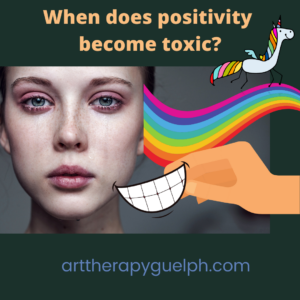
People benefit from positive thoughts, inspiring stories and working through their emotions to bring more positivity to their life. They may put a positive spin on a negative event, for example saying a mistake is a life lesson. Reframing negative thoughts can be healthy for one’s mental health. For example, rather than calling yourself stupid because you did not know how to set up a new device, you choose to say you are learning. It is a fact that when our thoughts are predominantly negative our mood suffers, and we become depressed (Beck 2020).
Isn't positive psychology good?
Well-meaning folks may unintentionally invalidate a person who needs to talk about how they feel and what is going on in their life. Toxic positivity promotes that only feelings of happiness and positive stories are valid. Toxic positivity is different from positive psychology. The latter was developed by Martin Seligman. It helps people to enhance their well-being by cultivating happiness, strength, and resilience to live a fulfilling life.
What is toxic positivity?
Toxic positivity is when people shut others down in a variety of ways. Gaba (2021) wrote that toxic positivity denies negative emotions such as sadness, loneliness, frustration, or anger. All emotions should be upbeat and happy. These emotions are not related to the reality of the situation. Natural and authentic emotions are invalidated. People are shamed for feeling emotions, discussing negative situations or feelings that arise. There is an inability to respect other people’s emotional experiences. Some sayings that are often linked to toxic positivity are telling someone it could be worse, pull yourself up by your bootstraps, cheer up, just think happy thoughts, don’t cry – think of something else, you will get over it or positive vibes only.
How to hold space for someone you care about
Instead, of using sayings that invalidate someone else’s lived experience, try holding space for them. This means to allow others an opportunity to share without judgement. Their heart may feel heavy, and they may need to get a few things off their chest. It is normal to feel emotions when things happen in life. Sometimes leaning into them can help you learn more about yourself and your thought processes. It can also provide opportunities for growth and change by reflecting on your thoughts that triggered your emotions. Share your feelings with people who deserve to hear your story. If you are feeling vulnerable to toxic positivity, create a safe space for sharing your emotions, journal, talk to someone you trust or see a professional therapist.
If you would like more information about Art Therapy Guelph, book a free get acquainted chat today, click here or call 519 827 9237
Beck, J. (2011), Cognitive behavioural therapy: Basics and beyond. New York New York, Guilford Press.
Gaba, S. (2021) Toxic positivity: How it relates to unhealthy relationships: 5 signs you are using toxic positivity as a coping tool. Psychology Today. Retrieved from URL https://www.psychologytoday.com/ca/blog/addiction-and-recovery/202103/toxic-positivity-how-it-relates-unhealthy-relationships
